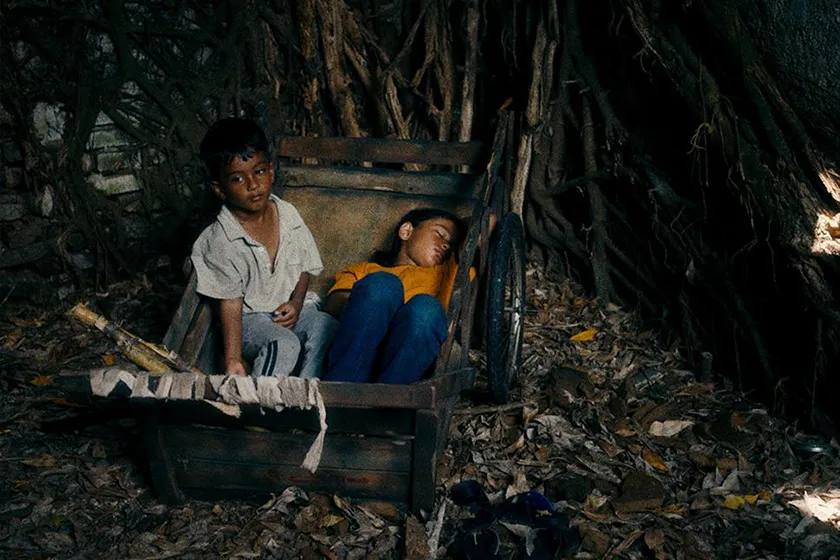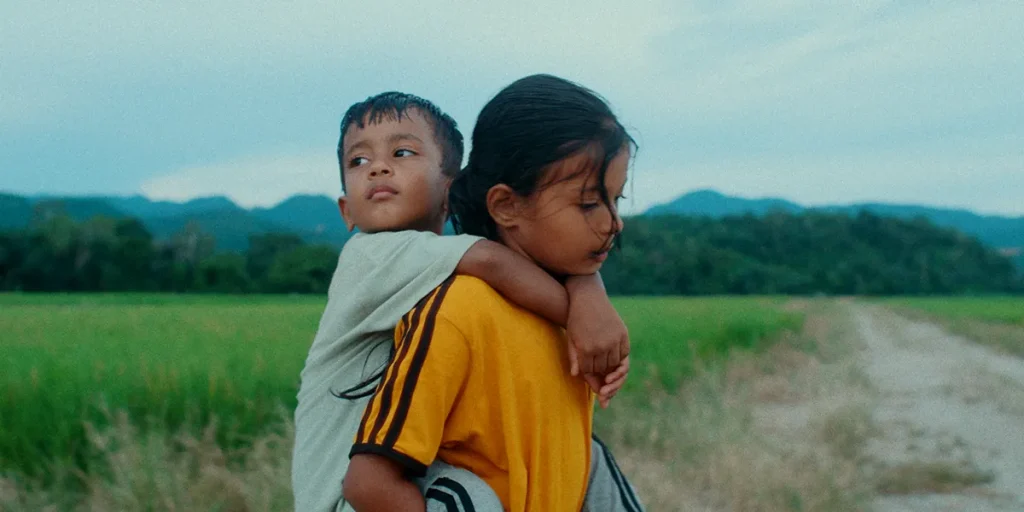Lost Land (Harà Watan) is a tender and haunting story of survival and hope that follows two Rohingya siblings on a perilous journey.
Writer & Director: Akio Fujimoto
Genre: Drama
Run Time: 99′
Venice World Premiere: September 1, 2025 (Orizzonti)
Release Date: TBA
Lost Land (Harà Watan) opens with Shafi and Somira playing hide-and-seek, their laughter filling the air before they are interrupted by their dad and the weight of their reality slowly takes over. That shift from carefree play to the harsh truth of displacement and survival sets the tone for everything that follows.
Director Akio Fujimoto doesn’t present the refugee crisis as something distant or abstract. Instead, he roots it in the small, everyday experiences of two children who never chose this path. By keeping the story so tightly focused on Shafi and Somira, he makes the Rohingya struggle feel deeply personal, tender, and impossible to look away from.
One of the biggest standouts is the raw authenticity of the performances. Muhammad Shofik Rias Uddin and Shomira Rias Uddin aren’t trained actors, yet they embody Shafi and Somira with such natural presence that it feels less like watching a performance and more like witnessing real children who carry the weight of unimaginable circumstances. Their interactions, whether it’s shared smiles or a moment of fear, pulse with genuine emotion. They feel like siblings we’ve known all our lives, which only makes their vulnerability harder to watch.
The cinematography by Yoshio Kitagawa amplifies this intimacy. The camera often lingers close, staying at the children’s eye level, as though we’re walking beside them. Fujimoto and Kitagawa create a visual experience that makes us feel present with Shafi and Somira, not just observing them from afar. It’s both beautiful and devastating: rivers shimmer under the sunlight even as they represent danger; forests look lush but conceal the unknown. The world they travel through is as cruel as it is breathtaking.

Fujimoto’s decision to blend harsh realism with fleeting moments of fantasy is particularly effective. It reflects how children, even in dire situations, carry imagination and hope with them. A playful gesture, a daydream, or a moment of wonder interrupts the darkness, reminding us of what is at stake: their stolen childhood. This balance of beauty and horror creates a haunting rhythm throughout the film.
The most remarkable part of Lost Land is how deeply personal it feels, even though it tells a story that is collective and ongoing. Fujimoto spent years listening to Rohingya voices, and that care shows in every frame. The choice to work with actual Rohingya participants, many of whom endured similar journeys, adds layers of authenticity that no script alone could achieve.
Lost Land (Harà Watan) is not an easy watch, nor should it be. It’s a heartbreaking reminder of how children are forced to carry burdens they never should, but it’s also a film that’s full of humanity and resilience. The performances, cinematography, and direction come together to create something deeply moving, the kind of cinema that stays with you long after the credits roll. Fujimoto has proven himself to be a filmmaker with extraordinary empathy and vision, and I’m eager to explore more of his work.
Lost Land (Harà Watan): Movie Plot & Recap
Synopsis:
Two Rohingya siblings, Shafi and Somira, leave a refugee camp in Bangladesh and embark on a dangerous journey to Malaysia, hoping to reunite with their family.
Pros:
- Beautiful, immersive cinematography that feels personal and immediate
- Remarkably authentic performances from Muhammad Shofik Rias Uddin and Shomira Rias Uddin
- A balance of harsh realism and fleeting childhood innocence
- Fujimoto’s direction shows extraordinary empathy and care for the subject
- The world feels both hauntingly beautiful and terrifying through the children’s eyes
Cons:
- Limited dialogue and context might leave certain audiences wanting more background
- The film’s understated approach may feel too minimal for those expecting a more traditional narrative arc
Lost Land (Harà Watan) had its World Premiere at the Venice Film Festival on September 1, 2025 in Orizzonti.

